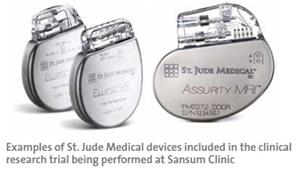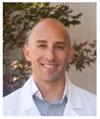
Until recently, the U.S. Food and Drug Administration prohibited patients with pacemakers or implantable cardioverter defibrillators (ICDs) from receiving magnetic resonance imaging (MRI) over fears that the devices could malfunction or the heart could be permanently damaged. New research from clinical trials has cleared the way for federal regulators to approve MRI for some of the latest generations of heart technologies.
Sansum Clinic is now hosting a clinical trial that provides imaging for patients with certain St. Jude Medical pacemakers and defibrillators, and is the only center between
Burbank and Redwood City to offer the service. The parent company, Abbott Laboratories, covers the cost of MRI for qualifying patients. Dr. Gregory Cogert, Sansum
Clinic’s cardiac electrophysiologist, supervises this research.
His resume is steeped with degrees from some of the finest academic institutions for cardiology in the country. He graduated from UC Irvine School of Medicine, completed his residency at UCLA Medical Center, did his fellowship in cardiovascular medicine at Cedars-Sinai Medical Center, and received his electrophysiology training at the Mayo Clinic in Minnesota. Dr. Cogert got the chance to run the Santa Barbara trial after scanning between 200-300 pacemaker and defibrillator patients as part of several research projects over the past few years. He’s collected a large reservoir of information
on how to safely scan this population. “If you take a patient with an old device and place them in an MRI scanner, you can get into trouble. It really needs to be handled appropriately with the device being evaluated before, during and after the procedure. That is all part of the research protocol. It can be safe when done properly,” explains Dr. Cogert.
Newer pacemakers are designed with increased shielding that protects them from magnetic interference. Patients no longer need to worry about passing thru metal detectors or using a microwave. The most current devices typically last a decade or more and contain wireless transmitters that communicate digitally with a doctor so function can be closely monitored.
In most cases when cardiac patients need an MRI, it’s to investigate a possible stroke. But there are countless other reasons why a person may require “the best scanning
modality,” according to Dr. Cogert. “Whether it’s an orthopedic injury, knee pain or really any part of the body, an MRI has some superior imaging capabilities. Now we can offer that to some of these patients,” notes Dr. Cogert.
A challenge remains though for the thousands whose devices don’t qualify for imaging via a clinical trial. Over 2 million people in the U.S. have pacemakers and ICDs. According to estimates from the American College of Cardiology, more than 50% of these patients will require an MRI after the device is inside them. “It’s frustrating because you know it can be done safely,” admits Dr. Cogert. “The research proves it. In an ideal world, the FDA would carefully look at the results of these trials and allow us to go back and scan these people.”
Dr. Cogert’s day-to-day work revolves around heart rhythm problems, when the heart is beating too fast or too slow. “People mainly talk about cardiology and think in terms of
the plumbing, doctors who take care of heart attacks and the valves. I focus on the electrical issues,” he describes.
After positions at several large academic centers, he is confident about the ability to appropriately and confidently treat any electrophysiology disorder.
He joins a group of physicians able to manage nearly any heart issue short of transplantation here at Sansum Clinic.
“We have so many phenomenal physicians that have made a lifestyle decision to live in Santa Barbara and we benefit from that. Coming to a smaller location, I wasn’t really sure what to expect, but I was blown away. I’m proud to be part of the Sansum Clinic team.”

Dr. Gregory A. Cogert, FACC, FHRS received his medical degree from University of California Irvine College of Medicine where
he also completed his internship and residency training. Dr. Cogert completed a fellowship in Cardiovascular Medicine at Cedars-Sinai Medical Center and a fellowship in Clinical Cardiac Electrophysiology Certification at Mayo Clinic. He is certified by the American Board of Internal Medicine in Cardiovascular Disease and Clinical Cardiac Electrophysiology in addition to certification by the National Board of Echocardiography and the Board of Nuclear Cardiology.